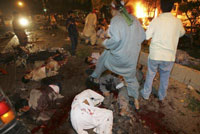Benazir Bhutto’s return to Pakistan ends with bomb attack that kills 126
Former premier Benazir Bhutto luckily escaped a suicide bomb attack that shattered her homecoming procession and killed up to 126 people hours after she returned to Pakistan from exile pledging to fight extremism and promote democracy.

Two explosions late Thursday - a grenade blast and a suicide bombing - struck near a truck carrying Bhutto through Karachi, shattering its windows and pockmarking its metal sides, but police said she was not injured and was hurried to her house. An Associated Press photo showed a dazed-looking Bhutto being helped away.
Click here to see photos from the scene of the explosions
Officials at six hospitals in Karachi reported 126 dead and 248 wounded, making it one of the deadliest bombings in Pakistan's history.
Karachi police chief Azhar Farooqi said that 113 people died, including 20 policemen, and that 300 people were wounded. It was not immediately possible to reconcile the differing death tolls.
Bhutto flew home earlier Thursday to lead her Pakistan People's Party in January parliamentary elections after eight years in exile, drawing cheers from supporters massed in a sea of the party's red, green and black flags in Pakistan's biggest city. The police chief said 150,000 were in the streets, while other onlookers estimated twice that.
The first explosion sounded like a tire had blown out on a bus. The blast sent people running as balls of flames, dirt and debris erupted into the night sky.
A police van was in flames, the streets were littered with the bodies of the dead. Arms, legs and other body parts were everywhere. Dozens of people were killed in the suicide attack that hit Bhutto’s procession that continued for more than ten hours along the streets of Karachi after she returned to the country from eight years in exile.
The first explosion sounded shortly before the midnight. The vehicle carrying Bhutto was moving very slowly through the crowd of dancing and cheering supporters. The second explosion followed shortly. Most of the killed were men, although witnesses say that they saw bodies of children too.
In the aftermath, bodies lay motionless in the street, under a mural reading "Long Live Bhutto" on the side of the truck. Pools of blood, broken glass, tires, motorcycles and bits of clothing littered the ground. Some of the injured were rushed on stretchers into a hospital, and others were carried by rescuers in their arms.
The bombing appeared to be the deadliest attack in Karachi's violent history. In April 2006, a suicide bombing killed 57 people, including the top leaders of a Sunni Muslim group.
The United States, the United Nations and the European Union condemned the attack.
"Extremists will not be allowed to stop Pakistanis from selecting their representatives through an open and democratic process," said Gordon Johndroe, foreign affairs spokesman for U.S. President George W. Bush.
Bhutto became leader of the Pakistan People's Party more than two decades ago after the military's 1979 execution of its popular founder, her father Zulfiqar Ali Bhutto.
She served twice as the elected prime minister between 1988 and 1996 - the Muslim world's first female premier - but both governments fell amid allegations of corruption. After Musharraf seized power, she was charged with illegally amassing wealth overseas while in power and she left Pakistan.
The following are some of the key events in her career:
Oct. 18, 2007 - Bhutto flies into Karachi, where tens of thousands of supporters give her a rousing welcome. Several hours later, she narrowly escapes suicide bombing during homecoming procession that kills 126 people. She is unharmed.
Oct. 5, 2007 - President Gen. Pervez Musharraf signs a corruption amnesty covering other cases against Bhutto, opening the way for her return and a possible power-sharing agreement.
April 14, 1999 - A court finds Bhutto guilty of corruption while she is out of the country. The conviction was later quashed, but Bhutto remains in exile.
Nov. 5, 1996 - President Farooq Leghari dismisses Bhutto's second administration amid accusations of nepotism and undermining the justice system.
Oct. 19, 1993 - Bhutto takes oath for a second term as prime minister.
Aug. 6, 1990 - President Ghulam Ishaq Khan dismisses Bhutto's government, citing corruption and a failure to control ethnic violence.
Dec. 1, 1988 - Bhutto, aged 35, becomes the first woman prime minister of a Muslim nation after winning parliamentary elections.
April 10, 1986 - Bhutto returns from exile in London to lead the Pakistan People's Party that her father founded.
April 4, 1979 - Bhutto's father, Zulfikar Ali Bhutto, is executed for the murder of a political opponent, two years after his ouster as prime minister in a military coup.
Subscribe to Pravda.Ru Telegram channel, Facebook, RSS!





